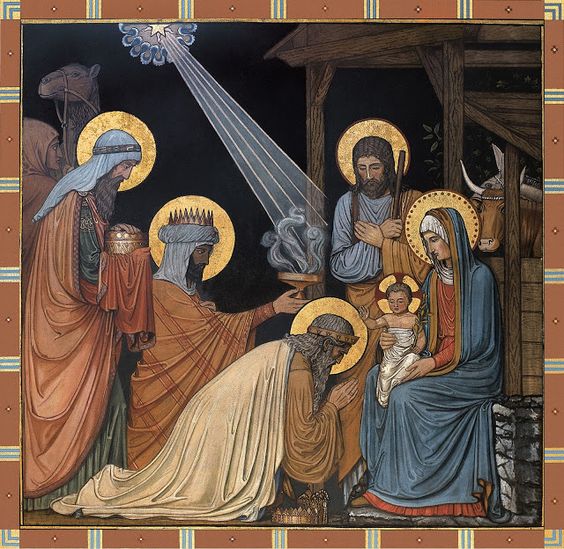The Story of Mother Mectilde and the Vocation of Perpetual Adoration
Mother Mectilde’s Birthday

In honour of the 410th birthday of the foundress of our charism that we celebrate today, we will be posting over the next few weeks the account of how Mother Mectilde was led to establish the Benedictines of Perpetual Adoration. The story begins in Paris, where Mother Mectilde was already a Benedictine and the superioress of a monastery in the Rue du Bac.
Civil Unrest and Poverty
In March 1651, Mother Mectilde, together with four companions, arrived in Paris, fleeing from the war that was ravaging their native Lorraine. They found the capital in turmoil, as the rebellion known as the Fronde was raging against King Louis XIV. The city gates were blocked, and the populace was threatened with starvation. The nuns from Lorraine found refuge in a “hospice” called Le Bon Ami (a former house of prostitution) in the Faubourg Saint-Germain. They had not so much as a bale of hay on which to sleep, and practically nothing to eat. The future was very dim indeed.
Temptation to Flee
All of this took its toll on the thirty-six year old Mother Mectilde, who at this time thought of withdrawing completely from what seemed to her an impossible situation. She seriously considered exiling herself in the south of France to live as a hermit in the mountainous wilds of Sainte-Baume, the region that, according to tradition, was the place of Saint Mary Magdalene’s long solitary penitence.
A Word in the Night
But on Easter night 1651, an interior voice spoke to Mother Mectilde, saying, “Renounce, adore, and submit to My designs”. In the grace of this word, she gave up her project of living as a hermit and, in pure faith, embraced the mysterious plan of God.
Mother Mectilde and Abba Arsenius
One cannot help but compare this word spoken to Mother Mectilde with a similar word given to Abba Arsenius: Fuge, tace, quiesce, “Flee, be silent, be at rest.” Mectilde is told to flee from her own projects, desires, and fears. She is told to be silent and adore God, perfect and loving in all His designs. Finally, she is told to submit, that is, to bow low beneath the Hand of God, to be at rest in cleaving to His Will with an unconditional and irrevocable “Yes”.
The three words that Mother Mectilde heard spoken in her soul contain all that is necessary for one to be happy in this life and in the next. Would that we had the wisdom to repeat them to ourselves every time we experience temptation, fear, disappointment, or darkness: “Renounce, adore, and submit.” These three words, in effect, go to the heart of what has been called the Mectildian-Benedictine charism.
Give Us This Day Our Daily Bread
Mother Mectilde’s surrender to God’s designs did not go unrewarded. The day came when there was no bread in the house. With her community around her, Mother Mectilde knelt down to say the Our Father. An instant later, who should arrive at the house but Monsieur de Margeuil, physician to Mother Mectilde’s compatriot, the Duchess of Orléans, Marguerite de Lorraine. De Margueil, appalled by the destitute conditions he discovered, appealed to the Duchess of Lorraine for help. Without delay, a group of charitable noble ladies arrived in a flurry, bringing relief: the Marquise de Boves, the Marquise de Cessac, Madame Mangot, Charlotte de Ligny, and Marie de la Guesle, the Countess of Châteauvieux, who would become Mother Mectilde’s closest spiritual friend.
 A Friendship
A Friendship
The indefectible friendship that grew up between the enclosed Benedictine and the grand lady of the world bore fruit in a remarkable correspondence. The Countess treasured Mectilde’s letters to her, and gathered them into a volume that she called her “breviary”. Happily, the so-called “breviary” of letters was copied, and has survived to the present. A few years ago, an oblate of our monastery translated these letters, which have been published as The Breviary of Fire. This correspondence represents, on the part of Mother Mectilde, a remarkably astute and demanding ministry of spiritual direction. The relationship between Mother Mectilde and Marie de la Guesle resembles, in many ways, that between Saint Teresa of Avila and her friend, the Duchess of Alba. The Countess would go on to play a providential role in the work to which God was about to call Mother Mectilde.
To be continued.
Share this:
- Click to share on Twitter (Opens in new window)
- Click to share on Reddit (Opens in new window)
- Click to share on Facebook (Opens in new window)
- Click to share on Pinterest (Opens in new window)
- Click to share on X (Opens in new window)
- Click to share on WhatsApp (Opens in new window)
- Click to print (Opens in new window)
Related Posts

